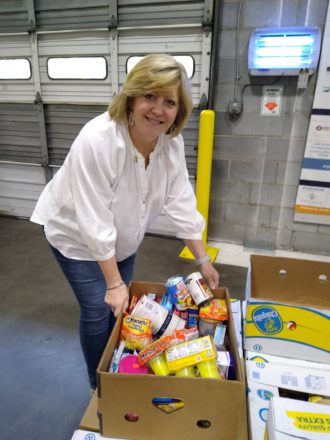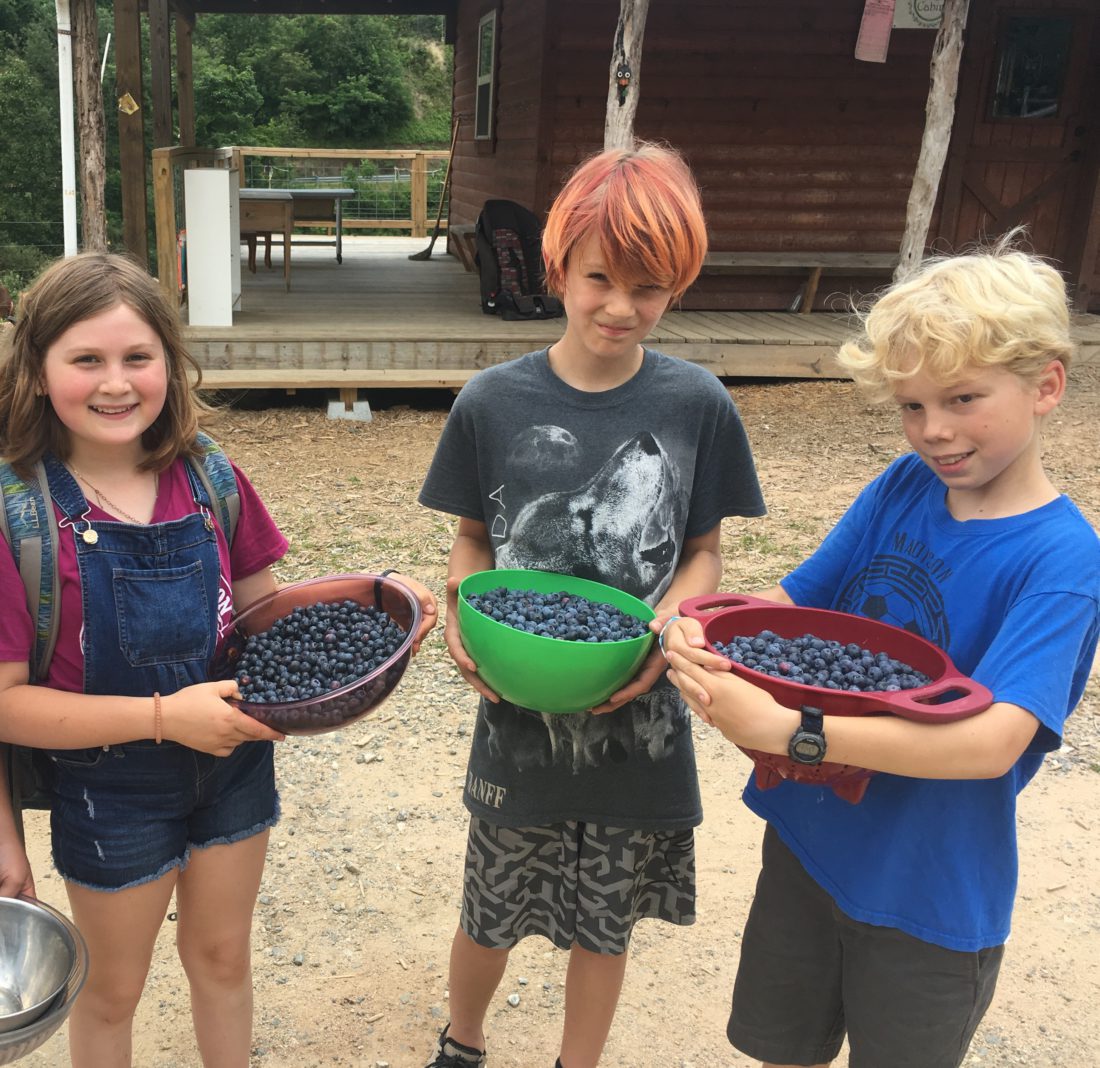It’s common knowledge that growing kids need regular, healthy meals to thrive. And, of course, good nutrition is especially crucial when it comes to fueling successful learning. But nearly one out of five children in Buncombe County live in homes that lack reliable access to fresh, wholesome food, according to 2017 data from Feeding America’s Map the Meal Gap project.
Federal free and reduced-price lunch and breakfast programs help ensure that the 53% of public school students who qualify are fed when they’re at school. But what happens when those kids go home for the evening or the weekend? And what about the 27% of Buncombe County’s food-insecure children who, according to Feeding America, likely aren’t eligible for those school food programs?
In order to fill those gaps, many Western North Carolina schools implement food pantry programs that support hungry students, their families and, sometimes, the broader community as well.
Most local schools with food pantries partner in some way with nonprofit organization MANNA FoodBank. One approach that’s seen incredible growth and success is the MANNA Packs for Kids program, which since 2006 has sent hungry students home each Friday with a bag full of nutrient-dense foods for the weekend.
Last school year, 168 schools within MANNA’s 16-county service area were enrolled in the MANNA Packs program, says MANNA education and youth services coordinator Beth Stahl. MANNA volunteers packed and distributed nearly 187,000 packs to students in the 2017-18 school year.
But while those prepackaged end-of-the-week goody bags have been extremely well-received by elementary-age kids, the food pantry approach has proven to work better with older students. “That’s primarily why we did a major shift from middle and high school trying to do the MANNA Packs,” Stahl explains.
“It just was not very private, not very discreet,” she continues. “There were a lot of positive things to starting a pantry — kids could go in at their leisure, sneak in and get what they need. A lot of schools will have it open all the time so it’s very easy for kids to not have to deal with peer pressure and whatnot.”
When Stahl spoke with Xpress in October, there were 13 schools enrolled as MANNA-supported pantries. “That doesn’t include the pantries that have community support,” she says, noting that often neighborhood organizations, clubs or churches adopt schools and furnish all or part of the items for their pantries.
MANNA’s pantry program is growing quickly, particularly with middle, high and charter schools. “There’s a substantial list of schools that are interested,” she says, mentioning several in Transylvania County that are poised to start pantries. “The intent this year is to really look at expansion.”
Stahl is quick to admit that there’s been a learning curve in setting up the pantry program. “We’ve really had to look at what older kids want to eat, and we’ve had to refine our [food] culling process,” she says. “We don’t want to send, you know, a banana box full of just rice, so we fill each box as if we’re stocking a pantry.”
She notes that foods that are popular with schools in one county don’t necessarily go over well in other parts of WNC. “It’s so culturally different. Like, there are some that want beef jerky, and some say, ‘No, we want 1-pound bags of pinto beans. It’s just kind of all over the place.”

A typical delivery for a school, according to Stahl, might be several produce boxes containing a variety of shelf-stable items such as dried pasta, spaghetti sauce, biscuit mix, tuna, oatmeal, granola bars and pudding cups, which Stahl says are “very popular.” A few schools also have refrigerators available for storing fresh produce and more.
The most-requested items at the end of the last school year were kid-friendly, easy-to-eat foods. “Hopefully with pop-tops,” says Stahl. “Because there are a lot of homeless kids that access those pantries. A can of ravioli with a pop-top is pretty readily available to eat.”
And it’s not only edibles that can be provided by school pantries. Stahl points to Enka High School, which operates a MANNA-supported pantry program. “This pantry covers everything,” she says. “There’s clothing, there’s health and personal care, there are school supplies — and if a kid can’t afford an Enka High School T-shirt, there’s that. Then there’s food and a myriad of different items.”
Enka High School social worker and pantry coordinator Lisa VonDohlen says the pantry, located in a room near the Student Services office, receives monthly food deliveries from MANNA as well as occasional donations from local individuals and organizations. VonDohlen and school volunteers maintain the space and inventory.
“It does not require a great deal of volunteer time and effort to maintain, though it does take some, of course,” she says. “We don’t have challenges maintaining the pantry, and I’m grateful for that.” Response to the program has been “overwhelmingly positive,” she adds.
Students and their families self-identify need or are referred by faculty or staff. “We always work to build trusting relationships with our students and use discretion when meeting student needs, whether it’s a basic need or academic, social or behavioral,” says VonDohlen.
“A huge part of that is ensuring that we uphold the dignity of each student we serve,” she continues. “This is critical in ensuring that students are comfortable reaching out for help when they need it.”
The nonprofit Woodson Branch Nature School also helps students meet their food needs, but in a much different way. Located on 30 acres in Madison County, this K-8, nonprofit, agriculturally focused experiential learning facility started out in 2008 sourcing food for student snacks and lunches from MANNA as one of its official partner agencies. But since 2016, the school has been growing its own food as part of its educational programming.
Although Woodson Branch is tuition-based, founder Deborah DeLisle says about 80% of its 100 or so students are only able to attend through funding from the NC Opportunity Scholarship Program. “This is not an affluent area at all,” she says. “It makes it tricky because we have very limited resources.”
Part of its five-year plan is to raise enough money to build a teaching and prep kitchen for classwork and turning campus harvests into daily student meals. Until then, DeLisle says, the school keeps a small portion of the bounty its farming program produces — which includes all kinds of vegetables, elderberries, blueberries, garlic, fresh eggs and more — and donates the rest to the community.
“We kind of got inspired by MANNA,” she says. “We take about 20% of [the food grown on campus] and disburse it to our families, we cook with it, make projects with it, teach kids how to preserve the food, and the rest of our produce goes to Beacon of Hope, which is our local food bank here in Madison County.”
The middle school students are actively involved in the partnership with Beacon of Hope. “It’s been really moving and meaningful to watch these 12- and 13-year-old kids get in there and hand food out, knowing that they grew it, that they had a part in that,” says DeLisle.
Though Woodson Branch currently isn’t able to serve lunches, it maintains its MANNA partnership, sourcing paper products and other supplies for the school as they’re available. These are also shared with families and staff when there’s an abundance.
Since it’s impractical to maintain a pantry space on campus for the fresh, seasonal foods the school makes available to its families, distribution is accomplished via a pop-up market model. “When parents come to pick their kids up, we’ll go right to their cars and ask them if they want anything,” DeLisle explains. “So parents can plan on getting nice bonuses and surprises.”




Before you comment
The comments section is here to provide a platform for civil dialogue on the issues we face together as a local community. Xpress is committed to offering this platform for all voices, but when the tone of the discussion gets nasty or strays off topic, we believe many people choose not to participate. Xpress editors are determined to moderate comments to ensure a constructive interchange is maintained. All comments judged not to be in keeping with the spirit of civil discourse will be removed and repeat violators will be banned. See here for our terms of service. Thank you for being part of this effort to promote respectful discussion.